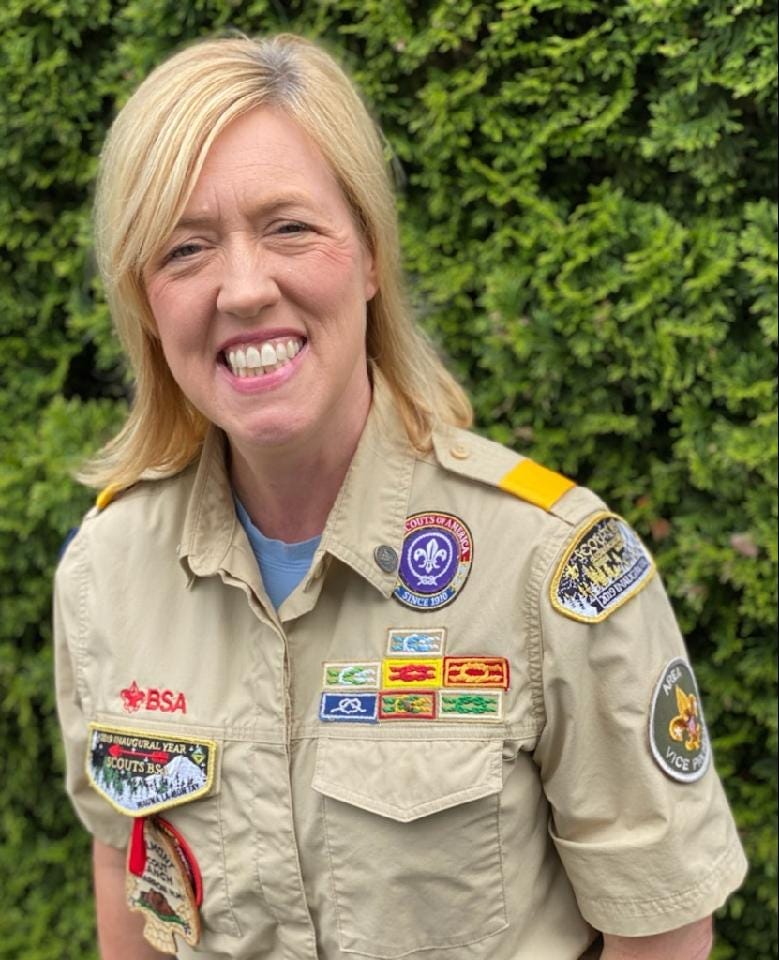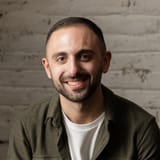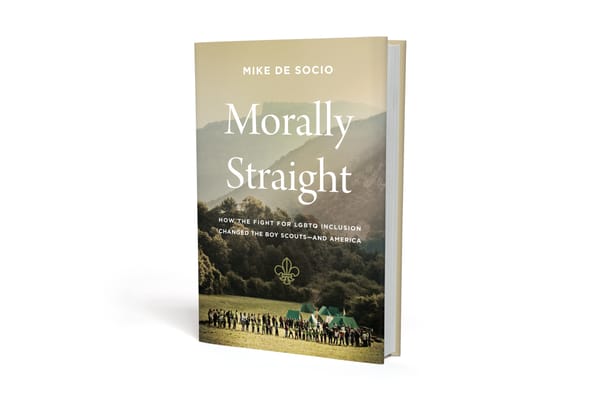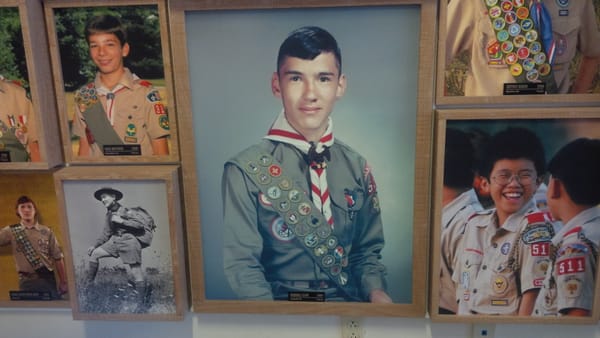Inside the new Scouts BSA task force for diversity, equity and inclusion
Kaleen Deatherage, leader of the new 12-person group, wants the BSA to be a place where all youth are not simply invited, but welcomed.

Kaleen Deatherage joined Scouting as an associate advisor of a co-ed Venturing Crew in Portland, Oregon. It was 2009, and she was leading a group that included a lot of girls — mostly 14-year-olds who were itching for more outdoor adventure than they could access through the Girl Scout program.
Soon enough, she started getting the same question over and over: Why didn’t girls have full access to the Scouting program?
“I didn't have a good answer for them, and I don't like it when I don't have a good answer,” Deatherage told me.
That’s when her passion for diversity, equity and inclusion was born. I spoke with Deatherage to learn more about where that path took her, and the work she’s doing now as the leader of the Scouts BSA task force for diversity, equity and inclusion.
MD: You had this realization that girls should be included in Scouts BSA long before such a change was even on the radar. How did that conversation evolve over time?
KD: I experienced the recognition that maybe this should change and the energy to change it. And in other places I experienced a lot of, “This is boy's space and we need to keep it boy's space.” And somehow the boys would lose if the girls had more access. And that I think was just part of the evolution. Those conversations changed over time.
When the move really began to happen was when people were confronted with the question: If we believe that the Boy Scouts of America is the premier youth-serving organization in the country, if not in the world, and that it's making a life-changing difference in leadership and values-based decision-making for the boys that are in the programs, why would we not also want that for the girls? And I think once that question really began to permeate hearts and minds, then the change began to happen.
You were very active in launching Scouts BSA for girls in your council. But you also had a turning point when you staffed a national Wood Badge course at the Summit in 2020. What happened there?
Rather than having men and women be in mixed-gender patrols, we actually had a women's troop and a men's troop, as a linked troop would be structured, and we carried out our week that way. Those women spent a week together where they had a lot of space that's just theirs. A lot of times when you are a female in Scouting, you're in a predominantly male space. So I think it was really powerful for these 65 women to kind of have their own opportunity to connect with one another.
And as a result of that week, there was a lot of conversation. And it became apparent throughout the week that, "Invited is not the same as welcome." We began to think a lot that week because we heard a lot about women experiencing spaces where they did not feel welcome, even if they were technically invited. And it became clear to our leadership that these weren't isolated incidences, this was happening more broadly around the country than perhaps we realized until then.
You were asked to lead a national gender equity task force for Scouts BSA. How did that evolve into the DEI task force?
This year in May, when leadership of the Scouts BSA committee transitioned, we had a big conversation about, does that task force continue with a primarily gender focus, or is it time to expand that more broadly and look at equity and inclusion as it pertains to everyone? And there was pretty unanimous agreement amongst several of us in that conversation that, while there continues to be work to do on gender equity issues, there's also work to do on orientation and ethnicity, et cetera, et cetera. So we decided to become then the DEI task force. And I was asked to chair that starting in May.
What does the DEI task force look like?
We are 12 people, counting myself. I got to build the task force, which was a great privilege and responsibility. And what was really important to me was that the task force could be a model for what we're hoping will happen out there. So it was very intentional about trying to have age diversity, gender diversity, orientation diversity, I mean we are a pretty diverse group, which is awesome. And we're getting to know each other right now. We really only met for the first time in August, so we're just getting going.
What questions are you starting to talk about?
We're doing some dialoguing around these questions: What is your truth about DEI and Scouting? If nothing changes around how we invite diversity and create welcoming, inclusive practices into Scouting, what's likely to occur? What are the most important things that the Scouts BSA DEI task force should be talking about? And then what's one area that, if approved, would make the greatest difference in the BSA?
Can you give me an example of what this work might end up looking like?
I'm sure that you are aware of the new Citizenship in Society merit badge, which is the evolution of the DEI merit badge that was drafted in 2020. That work is being spearheaded by our national staff member, DEI lead Elizabeth Ramirez-Washka, but our committee has offered our assistance to just be a part of messaging that out to the troops. There's lots of different levels of acceptance and readiness for that. There's questions and there's some confusion. So we see ourselves perhaps as a place that can help just get accurate information out.
Is your task force thinking about any issues specific to the LGBTQ+ community?
We haven't at this point written any goals that are specifically targeted to any particular marginalized community, but we have been clear about the outcomes that we hope to impact. So that would be things like: It's our desire and intent that BSA is a welcoming place for all eligible youth. It's our desired outcome that our professionals and our volunteers reflect the diversity of the youth and the communities that we serve. So I think we are hoping that we can influence the work at the local level, all the way to the national level. That we set our policies and our practices, and we deliver our programs through an equity lens.
I think that a lot of that will have to do with shaping some of the culture of how we scout. That happens slowly over time, but we were just speaking this week about, now is the best time to start. And by continuing to have these conversations and encourage people to think about what it means to create welcoming environments that are consistent with our Scouting values, that's how we're going to start to shift the culture. And that's pretty exciting to all of us because we know there's a lot of amazing kids out there in all different shapes and forms and types of communities who we think would really benefit from being involved in Scouting.
What challenges do you see in implementing these changes?
I think there's always challenges. Overcoming misinformation and misunderstanding, which is a real thing. We have many, many voices all across our country that are communicating Scouting messages and we can't ensure that all of those are consistent, but we can try to impact that by sharing as much information as we can and encouraging people to reflect Scouting's values in how they all they speak and how they share. So I think that's part of it.
I think the other reality is that we live in a complex and diverse country and individuals, families, communities, we're all in different stages of the DEI journey. We can't assume anyone's readiness to engage with the topic, but we need to continue to contribute to and influence a culture that is accepting of all youth. And that recognizes, in order for people to really come into our programs and thrive, they have to feel welcome. We go where we are invited, but we return to where we feel welcome.
That's where we have work to do, not just for our girls and women in Scouting, or our members of the LGBTQ community, or those who have different ethnic or religious backgrounds. If we really want to benefit from the diverse thinking and life experiences of all of those amazing people, then it's incumbent upon us to pull up more chairs to the table and make sure that our Scouting spaces are really ready to engage with all of those people where they're at.
This interview has been edited and condensed for clarity.


